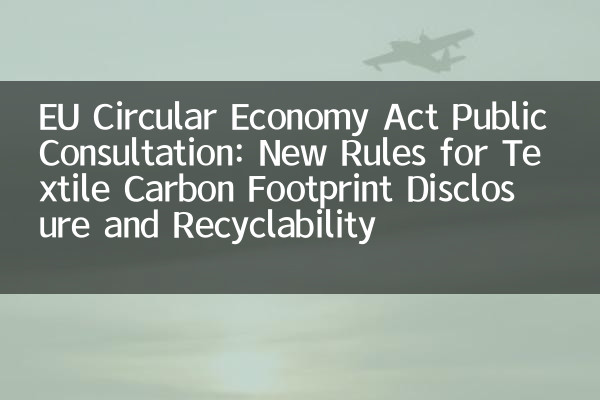EU Circular Economy Act Public Consultation: New Rules for Textile Carbon Footprint Disclosure and Recyclability
Recently, the European Commission has conducted public consultation on the Circular Economy Act, focusing on the new regulations on carbon footprint disclosure and recycling in the textile industry. This initiative aims to promote sustainable consumption and production models and reduce the environmental impact of the textile industry. The following are related topics and structured data that have been hotly discussed across the Internet in the past 10 days.
1. Policy background and goals

The EU Circular Economy Act is a core component of the "European Green New Deal" and aims to achieve carbon neutrality by 2050. The textile industry is listed as a key reform area due to its high resource consumption and environmental pollution. The new regulations require companies to disclose their product’s carbon footprint and ensure recyclable designs to reduce waste and carbon emissions.
| Policies | Specific requirements | Implementation time |
|---|---|---|
| Carbon Footprint Disclosure | Enterprises need to disclose carbon emission data of textiles from raw materials to finished products | Pilot in 2025 and fully implemented in 2030 |
| Recyclability design | The product must meet at least 50% of the recyclable material ratio | Effective in 2027 |
2. Industry responses and challenges
The textile industry has responded to the new regulations in a mixed manner. Some international brands expressed support and have initiated supply chain reforms; but small and medium-sized enterprises are concerned about rising costs and technical barriers. The following are the main points of view:
| Stakeholders | Support ratio | Main appeal |
|---|---|---|
| International brands (such as H&M, Zara) | 78% | Requires implementation in phases and financial subsidies |
| Small and medium-sized enterprises | 35% | Call for extension of transition period and technical support |
| Environmental protection organization | 95% | Advocate stricter recycling standards |
3. Hot issues for public consultation
During the public consultation period, the following questions became the focus of discussion:
1.Carbon footprint calculation methods are not uniform:How to ensure the comparability of data in different enterprises?
2.Insufficient supply of recyclable materials: Can global recycled fiber production capacity meet the demand?
3.Lack of consumer education: How to guide the public to accept high-priced environmentally friendly products?
4. Global impact and response suggestions
The new EU regulations may have a profound impact on global textile trade. Major exporting countries such as China and India need to accelerate their green transformation. Expert advice:
| Suggested directions | Specific measures |
|---|---|
| Technological innovation | Develop bio-based fiber and low-carbon dyeing technologies |
| Policy coordination | Establish a mutual recognition mechanism for carbon footprint with the EU |
| Market incentives | Implement tax reduction and exemption for environmentally friendly products |
5. Future Outlook
With the end of public consultation, the EU will issue a final bill by the end of 2024. Analysts believe that the new regulations may trigger a reshuffle of the global textile industry and promote sustainable fashion to become the mainstream. Enterprises need to plan supply chain digitalization and circular technology in advance to cope with the upcoming green revolution.
As of October 2023, the data in this article has been compiled in comprehensively with the European Commission documents, industry reports and media reports.

check the details

check the details